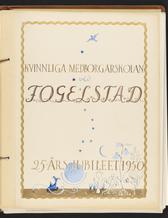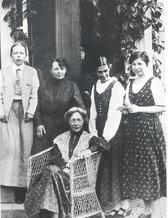Digitised archive: Kvinnliga Medborgarskolan vid Fogelstad
With funding from the Riksbankens Jubileumsfond, KvinnSam and the Digitisation Team at Gothenburg University Library have digitised the archive of the Kvinnliga Medborgarskolan vid Fogelstad, which is now available online.
Kvinnliga Medborgarskolan was founded in 1925 with the aim of educating women in citizenship after the introduction of suffrage. Now women were to take their place in public life! Just in time for the school's 100th anniversary, the archive has been made freely available thanks to a major digitisation project at KvinnSam.

‘Both the process of digitisation and the newly digitised materials have made it easier to see connections between archival documents as well as connections to other archives held by KvinnSam,’ says Christa Shusko, digitisation assistant in the project.
A key archive in the history of the Swedish Women's Movement
The archive of the Kvinnliga Medborgarskolan vid Fogelstad is of particular significance in terms of how women understood and worked to enter the public discourse in Sweden in the years following the success of the suffrage movement in 1919. The school's courses covered a wide range of traditional subjects such as history, social studies and psychology, practical citizenship, choir singing, gymnastics and rhythmics. The project has generated over 600 documents and nearly 20,000 digital images of course brochures, minutes, course registrations, songs, library catalogues, photographs and more.

A number of well-known figures in Swedish women's history were closely associated with the school's development and management, including its founder Elisabeth Tamm, Kerstin Hesselgren, Elin Wägner, Ada Nilsson and Honorine Hermelin. The only permanent teacher was Ebba Holgersson, but the organist and choir director Elsa Stenhammar and the actress Gerda Lundequist also returned regularly over the years. Guest lecturers included Siri Derkert, Emilia Fogelklou and Alexandra Kollontay.
‘A lot has also been discovered that has been less visible in research so far,’ says Rachel Pierce, research coordinator at KvinnSam. 'The focus has often been on the founders of the school and the people who were there as guest lecturers, but now the course participants are becoming more visible. Kitchen staff, barn and garden workers who worked for the school or on the Fogelstad estate are also becoming more visible. Several of these had come to Fogelstad as refugees from the war'.
Continued digitisation in the project

The project, which runs until the end of May 2026, continues the work of digitising photographs, enriching metadata, transcribing documents and creating resources to make the project more accessible on KvinnSam's website. KvinnSam has several archives with strong links to Fogelstad, not least the Fogelstad Association, which was started after the first course in 1925 and served as a forum for course participants and teachers. Select material from the association's archives will also be digitised as part of the project. .
‘We have previously joked that all roads in the archives lead to Fogelstad, but it is also true. So much of the women's movement in Sweden during the 20th century has its origins in Fogelstad, so it's great that the archive is now freely available for everyone to explore,’ says AnnaLena Bergquist, project manager and deputy director at KvinnSam.


